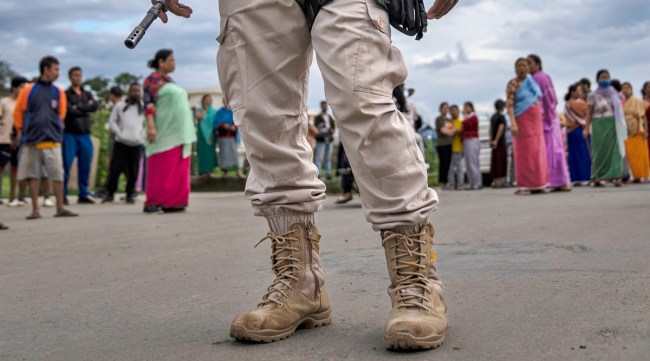Opinion The horrors of violence in Manipur: Internet ban has backfired, and access to arms is easy
Without access to the internet to verify facts, the ground has been rife with rumours, hate-mongering, and fake news
 A Manipur policeman stands guard as members of Meira Paibis block traffic to check vehicles for members from rival tribal Kuki community, in Imphal, Manipur, Jun 19, 2023. (AP)
A Manipur policeman stands guard as members of Meira Paibis block traffic to check vehicles for members from rival tribal Kuki community, in Imphal, Manipur, Jun 19, 2023. (AP) A spine-chilling video of two women from the Kuki community of Manipur being disrobed, paraded naked, groped, and gang-raped by a mob has gone viral. I tried to watch the full video but gave up within seconds, as I was shaken and deeply traumatised by what I saw. I shudder to think of the horrors the helpless women experienced.
The pride and honour of any community is perceived to be tied to women’s bodies. Since time immemorial, women’s bodies have been political battlefields. In times of conflict, communities assert their valour by violating the bodies of women from rival communities. Such crimes are mostly seen as an acceptable form of warfare, and the perpetrators enjoy impunity. Tragically, my home state of Manipur has been no different.
The horrific incident happened on May 4, more than two months before the video made its way to social media. According to reports, a First Information Report (FIR) was filed two weeks later by the family of the victims. The government not only failed to act throughout this period but also feigned ignorance. It is only because of the outrage on social media that the Chief Minister of Manipur, N Biren Singh, tweeted that authorities had taken “suo-moto cognizance of the incident immediately after the video surfaced” and made an arrest. Prime Minister Narendra Modi has finally broken his two-month long-silence on the conflict to condemn this appalling incident. But it is too little, too late.
Manipur has been burning for over 75 days now due to an ethnic conflict between two communities — Meiteis and Kukis. More than 150 people have been killed, bodies mutilated, women raped, scores of villages razed to the ground, and more than 50,000 people have fled their homes to seek refuge in relief camps. Two months in, there is no sign of peace or normalcy. Now because of the viral video, tensions are rising in various areas of the state. Fault lines run deep and there is massive mistrust between the two communities. Manipur continues to be a tinderbox.
Why has the violence continued for so long? There are three reasons for this:
First, both the state and central governments have failed to restore law and order. In May, more than 30,000 security personnel from paramilitary forces were brought into Manipur. Additional forces were brought in last month. Yet the violence has continued unmitigated. Last month, the chief minister made a statement about an unprecedented arrangement with the Home Ministry. Under it, the valley areas were to be administered by the state government and the hills by the Union government. This was akin to an unofficial declaration of President’s Rule in select areas. Despite this unique arrangement, the carnage has continued.
Second, the internet ban — including broadband services — imposed in the first week of May has still not been lifted. The government blocked the internet intending to control the spread of fake news and misinformation on social media. But in the long term, it has done more bad than good. Without access to the internet to verify facts, the ground has been rife with rumours, hate-mongering, and fake news. Any miscreant of X community trying to create trouble can resort to spreading rumours of attack/s by members of the rival Y community in some faraway village. With passions running high, such a rumour becomes the basis for one community to “retaliate” by attacking nearby villages of another community. This leads to a counter-retaliation. Thus, the vicious cycle continues.
The viral video in question made it to the internet over two months after the incident. The internet ban has kept violent atrocities occurring in Manipur suppressed — hidden from the rest of the world. Yet the government has shown no intention to lift the ban. A petition filed in the Supreme Court also yielded no result. The petitioners were asked to approach the Manipur High Court.
Third, easy access to arms and ammunition, mostly in the name of self-defence, has further prolonged the conflict. The looting of the government armoury and the unchecked entry of arms from the Myanmar border have ensured that most village volunteer groups are armed. Young men are trained to use guns and build bunkers to protect themselves in the event of any provocation. With everyone on tenterhooks in this tinderbox situation, the slightest provocation can escalate into an all-out gunfight resulting in deaths and destruction of land and livelihoods. The environment in Manipur is no less than that of a civil war.
Ordinary people of both communities have suffered immensely in the last two months. Men and women in areas of conflict have been living in perpetual fear for their lives, land, and properties. They have not had a proper night’s sleep or a relaxed meal in over two months. Due to the conflict, they have been unable to cultivate rice, the staple food of the state, in this sowing season. This has created fear of famine next year.
As I argued in my previous article (‘Calming the Manipur storm: Lessons from Gandhi for the central leadership’, IE, July 13) the path forward is a riddle that will take years of concerted efforts to rebuild, and there are lessons to be drawn from Gandhi’s Noakhali experiment. I hope the mounting public pressure finally forces the government to wake up and work towards restoring normalcy in the state.
The writer is founder, Femme First Foundation



